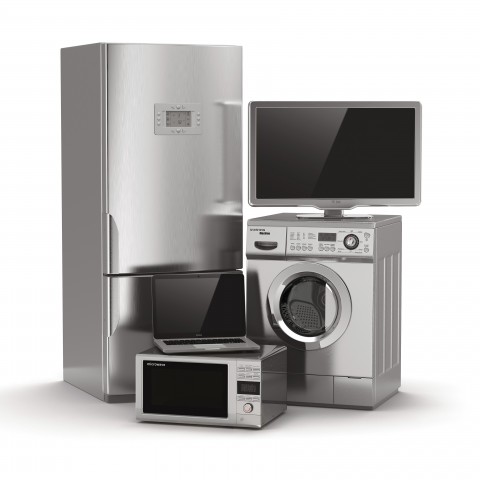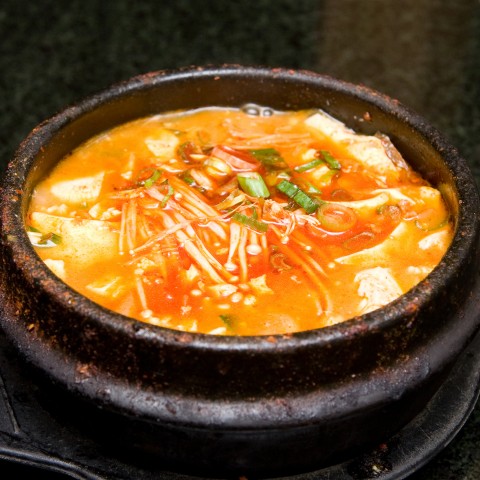
Learning a new language requires you to memorize new words everyday. The more you know, the faster you’ll be able to converse with the locals and even write letters to people. Today, we’ll introduce 100 Korean nouns for you to expand your vocabulary and improve your language skills. We’ve also provided audio files for you to practice the pronunciation of each word, so feel free to click on the words in our Korean nouns list!
Ready to learn Korean nouns with KoreanClass101.com? Let’s go!

Table of Contents
- 가전제품 (gajeonjepum) — Nouns for “Appliances”
- 과학 기술 (gwahak gisul) — Nouns for “Technology”
- 교통 (gyotong) — Nouns for “Transportation”
- 레스토랑 (reseutorang) — Nouns for “Restaurant”
- 학교 필수품 (hakgyo pilsupum) — Nouns for “School essentials”
- 직업 (jigeop) — Nouns for “Occupation”
- 가족 (gajok) — Nouns for “Family members”
- 신체 부분 (sinche bubun) — Nouns for “Body parts”
- 시간 (sigan) — Nouns for “Time”
- 한국 요리 재료 (hanguk yori jaeryo) — Nouns for “Korean Cooking Ingredients”
- How KoreanClass101 Can Help You
1. 가전제품 (gajeonjepum) — Nouns for “Appliances”

1- 헤어드라이기 (heeodeuraigi) — “Hair Dryer”
Things to Know
- 헤어 (he-eo) is the Korean way to pronounce “hair,” and 드라이 (deurai) is “dry.” 기 (gi) is from the Chinese character 機, which means “machine.”
- 드라이기 (deuraigi) is more commonly used in speaking.
- Some people say 헤어드라이어 (heeodeuraieo) too.
Example:
A: 헤어드라이기 좀 빌려줄래?A: Heeodeuraigi jom billyeojullae?
A: “Can I borrow your hair dryer?”
B: 어, 거기 첫번째 서랍 열면 있어.
B: Eo, geogi cheotbeonjjae seorap yeolmyeon isseo.
B: “Sure, it’s in the first drawer.”
Vocabulary:
2- 텔레비전 (tellebijeon) — “Television”
Things to Know
Example:
A: 엄마, 티비 봐도돼?A: Eomma, tibi bwadodwae?
A: “Mum, can I watch TV?”
B: 숙제 다하고 봐라.
B: Sukje dahago bwara.
B: “Finish your homework first!”
Vocabulary:
- 숙제 (sukje) — “homework”
3- 세탁기 (setakgi) — “Washing Machine”
Things to Know
Example:
A: 빨래할 옷이 많네. 세탁기 돌리자.A: Ppallaehal osi manne. Setakgi dollija
A: “There are so many things to wash! Let’s do laundry.”
B: 잠깐만! 나 빨래할 것 좀 가져올게!”
B: Jamkkanman! Na ppallaehal geot jom gajyeoolge!
B: “Wait up! Let me bring some of my dirty clothes!”
Vocabulary:

4- 냉장고 (naengjanggo) — “Refrigerator”
Things to Know
- Koreans have one or two refrigerators at home.
- The first is 냉장고 (naengjanggo). The other one is called 김치냉장고 (gimchinaengjango) or “Kimchi refrigerator.” [Read more about it]
Example:
A: 냉장고가 텅 비어있네. 장보러 가야겠다.A: Naengjanggoga teong bieoinne. Jangboreo gayagetda.
A: “There is nothing inside the refrigerator. I should go grocery shopping.”
B: 엄마, 나도 따라가면 안돼?
B: Eomma, nado ttaragamyeon andwae?
B: “Mum, can I come along?”
Vocabulary:
- 장(을) 보다 (jang(eul) boda) — “to go grocery shopping”
5- 청소기 (cheongsogi) — “Vacuum Cleaner”
Things to Know
- 로봇 청소기 (robot cheongsogi) is a vacuum cleaner that’s very popular in South Korea.
- Many Korean households have a 스팀 청소기 (seutim cheongsogi), “steam cleaner,” at home, too.
Example:
A: 아, 너무 피곤하다. 오늘 청소 미루면 안돼?A: A, neomu pigonhada. Oneul cheongso mirumyeon andwae?
A: “I’m so exhausted. Can we just postpone the cleaning?”
B: 뭐라고? 일요일마다 청소기 돌리기로 약속했잖아.
B: Mworago? Illyoilmada cheongsogi dolligiro yaksokaetjana.
B: “What? But we promised to vacuum the house on Sundays.”
Vocabulary:
- 미루다 (miruda) — “to postpone”
- 청소기(를) 돌리다 (cheongsogi(reul) dollida) — “to vacuum”
6- 핸드폰 (haendeupon) — “Mobile Phone”
Things to Know
- In 1983, the first mobile phone was released in South Korea.
- The first mobile phone was called 다이나택 8000X (dainataek), or “DynaTAC 8000X,” and it weighed approximately 794g (about twenty-eight ounces).
Example:
A: 다이나택 8000X은 8시간 충전하고 나서 30분 정도만 통화할 수 있었대.A: Dainataek palcheonekseuneun 8sigan chungjeonhago naseo 30bun jeongdoman tonghwahal su isseotdae.
A: “To use DynaTAC 8000X you needed to charge it for eight hours and could make a phone call for only 30 minutes.”
B: 대박, 진짜 별로다.
B: Daebak, jinjja byeolloda.
B: “Wow, that sounds really terrible.”
Vocabulary:
- 핸드폰 (haendeupon) — “mobile phone”
- 충전하다 (chungjeonhada) — “to charge”
- 통화하다 (tonghwahada) — “to talk on the phone”
7- 라디오 (radio) — “Radio”
Things to Know
- In South Korea, the first radio broadcasting occurred in 1927.
- The price of the radio was extremely expensive back in the 1920s (fifty bags of rice).
- Only the rich people could have radios back then. [reference]
Example:
A: 빨리 두시가 왔으면 좋겠다!A: Ppalli dusiga wasseumyeon joketda!
A: “I can’t wait until two o’clock!”
B: 아, 빨리 두시탈출 컬투쇼 듣고 싶구나?
B: A, ppalli dusitalchul keoltusyo deutgo sipguna?
B: “Ah, you are waiting for Culture Show, aren’t you?”
Vocabulary:
8- 에어컨 (eeokeon) — “Air Conditioner”
Example:
A: 날씨 너무 덥네. 숨을 못쉬겠어.A: Nalssi neomu deomne. Sumeul motswigesseo.
A: “I can’t breathe well because it’s too hot.”
B: 그럼 에어컨 빵빵 틀어주는 카페가자!
B: Geureom eeokeon ppangppang teureojuneun kapegaja!
B: “Then let’s go to a cafe that has a strong air conditioner!”
Vocabulary:
- 에어컨 빵빵 틀어줘.
Eeokeon ppangppang teureojwo.
“Please turn on the air conditioner.”
*This is a very casual phrase to say “turn on the air conditioner.”
9- 안마의자 (anmauija) — “Electric Massage Chair”
Example:
A: 한국에 안마의자가 없는 집은 찾기 힘들 걸?A: Hanguge anmauijaga eomneun jibeun chatgi himdeul geol?
A: “I think it’s quite rare to find a Korean house without an electric massage chair.”
B: 하긴, 찜질방, 목욕탕에도 안마의자도 있는걸.
B: Hagin, jjimjilbang, mogyoktangedo anmauijado inneungeol.
B: “That’s true, you can even see these chairs in public bath areas.”
Vocabulary:
- 찜질방 (jjimjilbang) — Korean gender-segregated public bathhouse
- 목욕탕 (mogyoktang) — “public bath”
10- 믹서기 (mikseogi) — “Blender”
Things to Know
- 믹서 (mikseo) means “mixer.”
- 기 (gi) is the Chinese character that means “machine.”
Example:
A: 딸기 스무디 어떻게 만들면돼?A: Ttalgi seumudi eotteoke mandeulmyeondwae?
A: “How do you make a strawberry smoothie?”
B: 그거 쉬워, 딸기랑 우유를 믹서기에 넣어서 갈면 돼.
B: Geugeo swiwo, ttalgirang uyureul mikseogie neoeoseo galmyeon dwae.
B: “It’s really easy. Just put some strawberries and milk into a blender and mix them.”
Vocabulary:
- 믹서기에 갈다 (mikseogie galda) — “to mix (in a blender)”
- ~에 넣다 (~e neota) — “to put something inside ~”

2. 과학 기술 (gwahak gisul) — Nouns for “Technology”
1- 노트북 (noteubuk) — “Laptop”
Example:
A: 노트북을 가지고 카페에서 일하는 사람이 많네A: Noteubugeul gajigo kapeeseo ilhaneun sarami manne.
A: “I can see many people with their laptops working at this cafe.”
B: 회사에만 있으면 답답하니깐 그럴것 같아.
B: Hoesaeman isseumyeon dapdapanikkan geureolgeot gata.
B: “Well, if I stayed inside the office all day, I would want to be in a cafe too.”
Vocabulary:
- 답답하다 (dapdapada) — “to feel suffocated”
2- 디지털 카메라 (dijiteol kamera) — “Digital Camera”
- When speaking, Koreans say 디카 (dika) which is a shortened word for “digital camera.”
Example:
A: 여기 사람들 다 셀카봉으로 사진 찍네.A: Yeogi saramdeul da selkabongeuro sajin jjingne.
A: “All the people here are holding a selfie-stick to take pictures.”
B: 요즘 디카 갖고 다니는 사람 찾기 힘들다 그치?
B: Yojeum dika gatgo danineun saram chatgi himdeulda geuchi?
B: “It’s difficult to find people who carry a digital camera these days, right?”
Vocabulary:
- 셀카봉 (selkabong) — “selfie-stick”
- 그치? (geuchi) — “right?”
3- 충전기 (chungjeongi) — “Charger”
Example:
A: 배터리 1%밖에 없네, 충전기 있어?A: Baeteori ilpeosenteubakke eomne, chungjeongi isseo?
A: “Only one percent left in my battery. Do you have a charger?”
B: 어, 있어. 케이블 갖고 있어? 난 아이폰 케이블 밖에 없어.
B: Eo, isseo. Keibeul gatgo isseo? Nan aipon keibeul bakke eopseo.
B: “Yeah I do. Do you have a cable with you? I only have an iPhone cable.”
Vocabulary:
- 배터리 (baeteori) — “battery”
- 케이블 (keibeul) — “cable”
4- 와이파이 (waipai) — “Wifi”
Example:
A: 와이파이 비밀번호는 뭐예요?A: Waipai bimilbeonhoneun mwoyeyo?
A: “What is the password for the wifi?”
B: 가게 전화번호가 비밀번호에요.
B: Gage jeonhwabeonhoga bimilbeonhoeyo.
B: “The password is the number of the store.”
Vocabulary:
5- 웹사이트 (wepsaiteu) — “Website”
Example:
A: 이 웹사이트는 어떻게 읽으면 돼나요?A: I wepsaiteuneun eotteoke ilgeumyeon dwaenayo?
A: “How do I read this website address?”
B: 코리안클래스101이라고 읽으면 돼요.
B: Koriankeullaeseuwonowonirago ilgeumyeon dwaeyo.
B: “It’s called KoreanClass101.”
Vocabulary:
- 웹사이트 (wepsaiteu) — “website”
6- 파일 (pail) — “File”
Example:
A: 다운로드 어떻게 하면돼?A: Daunnodeu eotteoke hamyeondwae?
A: “How do I download this?”
B: 이 파일을 열어서 다운로드 받으면 돼.
B: I paireul yeoreoseo daunnodeu badeumyeon dwae.
B: “Just open this file and download.”
Vocabulary:
7- 인터넷 (inteonet) — “Internet”
Example:
A: 한국은 인터넷 속도가 정말 빠른것 같아.A: Hangugeun inteonet sokdoga jeongmal ppareungeot gata.
A: “I think that the internet speed in Korea is really fast.”
B: 맞아, 무료 와이파이도 많고!
B: Maja, muryo waipaido manko!
B: “True, you can connect to free wifi everywhere!”
Vocabulary:
8- 비밀번호 (bimilbeonho) — “Password”
Example:
A: 와이파이 비밀번호 알려주세요.A: Waipai bimilbeonho allyeojuseyo.
A: “I’d like to know the wifi password.”
B: 비밀번호 없어요. 그냥 연결하시면 되요.
B: Bimilbeonho eopseoyo. Geunyang yeongyeolhasimyeon doeyo.
B: “There is no wifi password. Just connect to the wifi.”
Vocabulary:
- 비밀번호 (bimilbeonho) — “password”
9- 스팸 (seupaem) — “Spam”
Example:
A: 요즘 스팸메일이 너무 오는 것 같아.A: Yojeum seupaemmeiri neomu oneun geot gata.
A: “There have been a lot of spam emails lately.”
B: 그러게. 스팸메일이 20개나 와있네.
B: Geureoge. Seupaemmeiri seumu gaena wainne.
B: “You’re right. There are twenty spam emails.”
Vocabulary:
10- 스마트폰 (seumateupon) — “Smartphone”
Example:
A: 새로운 스마트폰 샀어?A: Saeroun seumateupon sasseo?
A: “Did you buy a new smartphone?”
B: 응, 이쁘지?
B: Eung, ippeuji?
B: “Yeah, isn’t it pretty?”
Vocabulary:
스마트폰 (seumateupon) — “smartphone”KoreanClass101 has a free vocabulary list called “Top 20 Words You’ll Need for the Internet.” Check out this page to learn more useful Korean nouns.

3. 교통 (gyotong) — Nouns for “Transportation”
1- 비행기 (bihaenggi) — “Airplane”
Things to know
- 비행 (bihaeng) means “flight” and 기 (gi) means “machine.”
Example:
A: 뉴스 들었어? 비행기 추락 사고로 30명이 죽었데.A: Nyuseu deureosseo? Bihaenggi churak sagoro samsip myeongi jugeotde.
A: “Did you hear about the news? Thirty people died in a plane crash.”
B: 헐.
B: Heul.
B: “Whoa.”
Vocabulary:
2- 기차 (gicha) — “Train”
- A synonym of 기차 (gicha) is 기관차 (gigwancha) meaning “engine locomotive.”
Example:
A: 주말에 대구 가고 싶은데, 뭐 좋은 방법 없나?A: Jumare daegu gago sipeunde, mwo joeun bangbeop eomna?
A: “I want to go to Daegu this weekend, is there a good way to go?”
B: 기차타고 가면 되지! 엄청 싸!
B: Ggichatago gamyeon dwaeji! Eomcheong ssa!
B: “If you go there by train, it’s cheap!”
Vocabulary:
3- 전철 (jeoncheol) — “Subway”
Example:
A: 여기서 강남역까지 가려면 어떻게 가면돼?A: Yeogiseo gangnamyeokkkaji garyeomyeon eotteoke gamyeondwae?
A: “How do I go to Gangnam Station from here?”
B: 여기서 2호선 전철타고 가면돼.
B: Yeogiseo ihoseon jeoncheoltago gamyeondwae.
B: “Just get on the line 2.”
Vocabulary:
- 전철 (jeoncheol) — “subway”
4- 버스 (beoseu) — “Bus”
Example:
A: 버스 정류장이 어디에 있지?A: Beoseu jeongnyujangi eodie itji?
A: “Where is the bus stop?”
B: 시내버스? 아니면 마을버스? 버스에 따라 정류장이 달라.
B: Sinaebeoseu? Animyeon maeulbeoseu? Beoseue ttara jeongnyujangi dalla.
B: “City bus or village bus? The bus stops vary.”
Vocabulary:
5- 택시 (taeksi) — “Taxi”
Things to Know
- There are many different kinds of taxis in Korea. The two main taxis are called 일반택시 (ilbantaeksi) and 모범택시 (mobeomtaeksi), meaning “regular taxi” and “deluxe taxis” respectively.
Example:
A: 어디로 가십니까?A: Eodiro gasimnikka?
A: “Where are you heading off to?”
B: 잠실역까지 가주세요.
B: Jamsillyeokkkaji gajuseyo.
B: “To Jamsil station, please.”
Vocabulary:
- 택시 (taeksi) — “taxi”

6- 자전거 (jajeongeo) — “Bicycle”
Example:
A: 녹색 자전거를 타고 회사로 가는 사람들이 많네?A: Noksaek jajeongeoreul tago hoesaro ganeun saramdeuri manne?
A: “I noticed that there are many people who use green bicycles to go to work.”
B: 응, 저거 따릉이라고 해. 자전거 대여해서 타고 다니는거래.
B: Eung, jeogeo Ttareungirago hae. Jajeongeo daeyeohaeseo tago danineungeorae.
B: “Yeah, it’s called Ttareung. You can rent it.”
Vocabulary:
7- 신호등 (sinhodeung) — “Traffic Light”
Example:
A: 여기는 신호등을 무시하고 운전하는 택시가 많은 것 같아.A: Yeogineun sinhodeungeul musihago unjeonhaneun taeksiga maneun geot gata.
A: “It seems that there are so many taxis that ignore the traffic lights here.”
B: 응, 그래서 길을 건널때는 항상 조심해야해.
B: Eung, geuraeseo gireul geonneolttaeneun hangsang josimhaeyahae.
B: “Yeah, so you need to be extra careful when you cross the roads.”
Vocabulary:
8- 교차로 (gyocharo) — “Intersection”
Example:
A: 저기 경찰이 교차로에 서 있어. 위험하지 않을까?A: Jeogi gyeongchari gyocharoe seo isseo. Wiheomhaji aneulkka?
A: “A policeman is at the intersection. Isn’t it too dangerous for him?”
B: 괜찮아. 교통정리하는거니깐.
B: Gwaenchana. Gyotongjeongnihaneungeonikkan.
B: “It’s fine. He is doing a traffic control.”
Vocabulary:
- 교차로 (gyocharo) — “intersection”
- 교통정리 (gyotongjeongli) — “traffic control”
9- 도로 (doro) — “Road”
Example:
A: 지금 우리 집 옆에 도로 확장 공사를 하고 있어서 엄청 시끄러워.A: Jigeum uri jip yeope doro hwakjang gongsareul hago isseoseo eomcheong sikkeureowo.
A: “There is work on a road-widening project, so it’s really noisy.”
B: 진짜 스트레스 받겠다.
B: Jinjja seuteureseu batgetda.
B: “That must be really stressful.”
Vocabulary:
- 도로 (doro) — “road”
- 도로 확장 공사 (doro hwakjang gongsa) — “a road-widening project”
- 스트레스 (seuteureseu) — “stress”
10- 길 (gil) — “Street”
Example:
헨젤과 그레텔은 숲에서 길을 잃고야 말았어요.Henjelgwa geuretereun supeseo gireul ilkoya marasseoyo.
“Hansel and Gretel lost their way in the deep forest.”
Vocabulary:
11- 횡단보도 (hoengdanbodo) — “Pedestrian Road”
Example:
A: 할머니가 횡단보도를 천천히 건너고 계시네. 신호바뀌면 어떻하지.A: Halmeoniga hoengdanbodoreul cheoncheonhi geonneogo gyesine. Sinhobakkwimyeon eotteohaji.
A: “There is an elder crossing the pedestrian road slowly. What do we do if the traffic light changes?”
B: 그럼 할머니랑 같이 걸어가자.
B: Geureom halmeonirang gachi georeogaja.
B: “Then let’s cross the road with my grandmother.”
Vocabulary:

4. 레스토랑 (reseutorang) — Nouns for “Restaurant”
1- 숟가락 (sutgarak) — “Spoon”
Example:
A: 한국 식탁에는 숟가락과 젓가락을 많이 쓰고 있어.A: Hanguk siktageneun sutgarakgwa jeotgarageul mani sseugo isseo.
A: “Spoons and chopsticks are used a lot in Korea.”
B: 그렇구나. 우린 포크와 나이프를 쓰고 있어.
B: Geureokuna. Urin pokeuwa naipeureul sseugo isseo.
B: “I see. We use forks and knives.”
Vocabulary:
2- 접시 (jeopsi) — “Plate”
Example:
A: 우와 이 접시 너무 이쁘다.A: Uwa i jeopsi neomu ippeuda.
A: “Wow this plate is so pretty.”
B: 얼마인데? 헉, 접시 하나에 10만원? 너무 비싼거 아냐?
B: Eolmainde? Heok, jeopsi hanae simmanwon? Neomu bissangeo anya?
B: “How much is it? What, 100,000 won for a plate? Isn’t it too expensive?”
Vocabulary:
3- 유리잔 (yurijan) — “Glass”
Example:
A: 저 남자 멋있지 않아?A: Jeo namja meositji ana?
A: “Isn’t he handsome?”
B: 어디? 유리잔에 든 와인 마시고 있는 남자?
B: Eodi? Yurijane deun wain masigo inneun namja?
B: “Where? The man who is drinking wine from a glass?”
Vocabulary:
4- 물 (mul) — “Water”
Example:
A: 운동할때는 물을 많이 마셔줘야해.A: Undonghalttaeneun mureul mani masyeojwoyahae.
A: “You need to drink lots of water when exercising.”
B: 물도 그렇지만 스포츠드링크 많이 마셔주면 좋데.
B: Muldo geureochiman seupocheudeuringkeu mani masyeojumyeon jote.
B: “Water is important, but it is good to drink sports drinks too.”
Vocabulary:
5- 맥주 (maekju) — “Beer”
Example:
A: 소맥이 뭐야?A: Somaegi mwoya?
A: “What is Somaek?”
B: 소주랑 맥주 섞어서 만든 음료를 소맥이라고해.
B: Sojurang maekju seokkeoseo mandeun eumnyoreul somaegiragohae.
B: “It is a drink that’s mixed with Soju and beer.”
Vocabulary:
6- 양식 (yangsik) — “Western Food”
Example:
A: 오늘 저녁 뭐 먹으러갈까?A: Oneul jeonyeok mwo meogeureogalkka?
A: “What do you want to eat for dinner?”
B: 양식 먹고 싶은데, 집앞에 있는 레스토랑 갈래?
B: Yangsik meokgo sipeunde, jibape inneun reseutorang gallae?
B: “I feel like eating some Western food; do you want to go to a restaurant near the house?”
Vocabulary:
- 양식 (yangsik) — “Western food”
- 집앞 (jibap) — “in front of the house”
7- 채식 (chaesik) — “Vegetarian Food”
Example:
A: 유리는 채식주의자인데, 어디서 밥먹는게 좋을까?A: Yurineun chaesikjuuijainde, eodiseo bammeongneunge joeulkka?
A: “Yuri is vegetarian, where do you think we should eat?”
B: 이태원에 채식 레스토랑 많아. 거기로 가볼까?
B: Itaewone chaesik reseutorang mana. geogiro gabolkka?
B: “There are many vegetarian restaurants in Itaewon. Should we go and check it out?”
Vocabulary:
8- 금연 (geumyeon) — “Non-smoking”
Example:
금연석으로 주세요.Geumyeonseogeuro juseyo.
“I’d like to have a non-smoking seat, please.”
Vocabulary:
9- 계산서 (gyesanseo) — “Check”
Example:
계산서 주세요.Gyesanseo juseyo.
“Could I have the check?”
Vocabulary:
- 계산서 (gyesanseo) — “check”
10- 식사 (siksa) — “Meal”
Example:
A: 식사 하셨어요?A: Siksa hasyeosseoyo?
A: “Did you eat anything yet?”
B: 아니요, 아직 안했어요.
B: Aniyo, ajik anhaesseoyo.
B: “No, not yet.”
Vocabulary:
- 식사 (siksa) — “meal”
- ~ 하셨어요? (~hasyeosseoyo?) — “Did you do ~ yet?”

5. 학교 필수품 (hakgyo pilsupum) — Nouns for “School essentials”
1- 공책 (gongchaek) — “Notebook”
Example:
A: 오늘의 숙제는 공책에 일기를 써 오는거예요.A: Oneurui sukjeneun gongchaege ilgireul sseo oneungeoyeyo.
A: “Today’s homework is to write a diary entry in your notebook.”
B: 네, 선생님.
B: Ne, seonsaengnim.
B: “Okay, teacher.”
Vocabulary:
2- 숙제 (sukje) — “Homework”
Example:
A: 오늘 숙제 안해온 사람 앞으로 다나와!A: Oneul sukje anhaeon saram apeuro danawa!
A: “Come to the front if you didn’t do your homework!”
B: 어떻하지, 오늘 깜빡하고 숙제를 안 가지고 왔어.
B: Eotteohaji, oneul kkamppakago sukjereul an gajigo wasseo.
B: “What should I do; I forgot to bring my homework today.”
Vocabulary:
3- 친구 (chingu) — “Friend”
Example:
A: 수미는 초등학교때부터 계속 알고 지내던 친구야.A: Sumineun chodeunghakgyottaebuteo gyesok algo jinaedeon chinguya.
A: “Sumi is a friend that I’ve known since primary school.”
B: 아 정말?
B: A jeongmal?
B: “Oh really?”
Vocabulary:
4- 학교 (hakgyo) — “School”
Example:
버스를 놓쳤어. 학교 늦으면 안되는데 어떡하지.Beoseureul nochyeosseo. hakgyo neujeumyeon andoeneunde eotteokaji.
“I missed the bus. I must not be late to school, what should I do?”
Vocabulary:
5- 학생 (haksaeng) — “Student”
Example:
A: 칠판의 문제를 19번 학생이 풀어보세요.A: Chilpanui munjereul 19beon haksaengi pureoboseyo.
A: “Try to solve problem 19 on the board.”
B: 네, 선생님
B: Ne, seonsaengnim.
B: “Yes, teacher.”
Vocabulary:
6- 전공 (jeongong) — “Major”
Example:
A: 대학교 전공 정했어?A: Daehakgyo jeongong jeonghaesseo?
A: “Did you decide on what major you want to study at university?”
B: 아니… 난 뭐하고 싶은지도 모르겠어.
B: Ani… nan mwohago sipeunjido moreugesseo.
B: “No… I’m not even sure what I want to do.”
Vocabulary:

7- 수업 (sueop) — “Class”
Example:
A: 수업시간에 떠들면 선생님한테 혼나.A: Sueopsigane tteodeulmyeon seonsaengnimhante honna.
A: “You will get in trouble if you talk during class.”
B: 응 조용히 할게 미안.
B: eung joyonghi halge mian.
B: “Yeah, I will be quite sorry.”
Vocabulary:
8- 선생님 (seonsaengnim) — “Teacher”
Example:
A: 선생님 질문이 있어요.A: Seonsaengnim jilmuni isseoyo.
A: “Teacher, I have a question.”
B: 응 뭔데?
B: Eung mwonde?
B: “Yes, what is it?”
Vocabulary:
9- 질문 (jilmun) — “Question”
Example:
A: 질문있으면 언제든지 말해보렴.A: Jilmunisseumyeon eonjedeunji malhaeboryeom.
A: “If you have any questions, just speak out.”
B: 네.
B: Ne.
B: “Okay.”
10- 선후배 (seonhubae) — “The Senior-Junior Relationship”
Things to Know:
- This word is the combination of 선배 (seonbae), meaning “a senior,” and 후배 (hubae), meaning “a junior.”
- Learn more about this special relationship that exists in Korea by reading Korean Honorific Titles: Oppa, Unni, Hyung, Nuna & more on our blog.
Example:
한국 사회에서는 선후배 관계가 정말 중요한것 같아.Hanguk sahoeeseoneun seonhubae gwangyega jeongmal jungyohangeot gata.
“I think that the senior-junior relationship is very important in Korean society.”
Vocabulary:
- 선후배 (seonhubae) — “the senior-junior relationship”
- 사회 (sahoee) — “society”

6. 직업 (jigeop) — Nouns for “Occupation”
1- 간호사 (ganhosa) — “Nurse”
Example:
수미는 간호사로 일하고 있어.Sumineun ganhosaro ilhago isseo.
“Sumi is working as a nurse.”
Vocabulary:
2- 회사원 (hoesawon) — “Office Worker”
Example:
저 사람은 회사원인 것 같아.Jeo sarameun hoesawonin geot gata.
“I think he is an office worker.”
Vocabulary:
- 회사원 (hoesawon) — “office worker”
- ~인 것 같아 (~in geot gata) — “I think that~”
3- 의사 (uisa) — “Doctor”
Example:
최근에 의사면허를 취득했어.Choegeune uisamyeonheoreul chwideukaesseo.
“I recently obtained a medical doctor’s license.”
Vocabulary:
4- 음악가 (eumakga) — “Musician”
Example:
어른이 되면 음악가가 되고 싶어요.Eoreuni doemyeon eumakgaga doego sipeoyo.
“When I grow up, I want to be a musician.”
Vocabulary:
5- 교수 (gyosu) — “Professor”
Example:
교수님은 지금 안계세요.Gyosunimeun jigeum angyeseyo.
“The professor is not here right now.”
Vocabulary:
- 교수 (gyosu) — “professor”
6- 변호사 (byeonhosa) — “Lawyer”
Example:
유리는 변호사로 일하고 있어.Yurineun byeonhosaro ilhago isseo.
“Yuri is working as a lawyer.”
Vocabulary:
7- 군인 (gunin) — “Soldier”
Example:
저기 봐. 구석에 철모를 쓴 군인이 서있어.Jeogi bwa. Guseoge cheolmoreul sseun gunini seoisseo.
“Look, there is a helmeted soldier standing at the corner.”
Vocabulary:
8- 경찰관 (gyeongchalgwan) — “Police Officer”
Example:
오늘 아침에 경찰관이 용의자를 뒤 쫓아가는 모습을 봤어.Oneul achime gyeongchalgwani yonguijareul dwi jjochaganeun moseubeul bwasseo.
“I saw a policeman run after the suspect this morning.”
Vocabulary:
- 경찰관 (gyeongchalgwan) — “police officer”
- 용의자 (yonguija) — “suspect”
9- 예술가 (yesulga) — “Artist”
Example:
A: 발레리나 강수진알아?A: Ballerina Kang Sue-jinara?
A: “Do you know a ballerina called Kang Sue-jin?”
B:예술가들에 대해서는 잘 몰라요.
B: Yesulgadeure daehaeseoneun jal mollayo.
B: “I don’t know much about artists.”
Vocabulary:
10- 요리사 (yorisa) — “Chef”
Example:
A: 어떤 요리가사 되고 싶어?A: Eotteon yorigasa doego sipeo?
A: “What kind of chef do you want to be?”
B: 한식 요리사가 되고 싶어!
B: Hansik yorisaga doego sipeo!
B: “I want to be a chef that specializes in Korean food.”
Vocabulary:
- 요리사 (yorisa) — “chef”
Are you looking for a job and want to know how to say your occupation in Korean? Check out “Jobs,” a free vocabulary list from out website, and learn how to say your job in Korean. We’ve also written a blog about “How to Find a Job in South Korea.” Do check out the pages when you have time.

7. 가족 (gajok) — Nouns for “Family members”
1- 할머니 (halmeoni) — “Grandmother”
Example:
할머니 생일 선물 사 드릴게요.Halmeoni saengil seonmul sa deurilgeyo.
“I’ll buy you a birthday present, Grandma.”
Vocabulary:
2- 할아버지 (harabeoji) — “Grandfather”
Example:
엄마랑, 아빠랑, 할아버지랑, 누나랑 다 같이 여행했어요.Eommarang, apparang, harabeojirang, nunarang, dagachi yeohaenghaesseoyo.
“We all went on a trip with my mom, dad, grandfather, and my sister.”
Vocabulary:
3- 어머니 (eomeoni) — “Mother”
Example:
어머니께서는 먼데서 뭘 이런 것까지 신경 썼냐며 첫마디를 여셨지만, 내심 많이 기쁘신 모양입니다.Eomeonikkeseoneun meondeseo mwol ireon geotkkaji singyeong sseonnyamyeo cheonmadireul yeosyeotjiman, naesim mani gippeusin moyangimnida.
“My mother’s first words were ‘You didn’t have to go out of your way to send these things from so far away,’ but it was apparent that she was very happy inside.”
Vocabulary:
4- 아버지 (abeoji) — “Father”
Example:
아버지 뭐하세요?Abeoji mwohaseyo?
“What are you up to, Dad?”
Vocabulary:
- 아버지 (abeoji) — “father”
- 뭐하세요? (mwohaseyo?) — “What are you up to?”
5- 아내 (anae) — “Wife”
Example:
저는 한 남자의 아내이자 두 아이의 엄마입니다.Jeoneun han namjaui anaeija du aiui eommaimnida.
“I’m a wife and a mother of two children.”
Vocabulary:
6- 남편 (nampyeon) — “Husband”
Example:
혜미는 사고로 1년전 남편을 잃었다.Hyemineun sagoro ilnyeonjeon nampyeoneul ileotda.
“Hyemi lost her husband in an accident, a year ago.”
Vocabulary:
7- 딸 (ttal) — “Daughter”
Example:
효선은 딸들을 모두 시집보내고 혼자 살고 있어.Hyoseoneun ttaldeureul modu sijipbonaego honja salgo isseo.
“Hyosun married off all her daughters and lives alone now.”
Vocabulary:
- 딸 (ttal) — “daughter”
- 시집가다 (sijipgada) — “to get married” [Used only for females]
8- 아들 (adeul) — “Son”
Example:
현아가 오늘 아침에 아들을 낳았데!Hyeonaga oneul achime adeureul naatde!
“Hyeona had a baby boy this morning!”
Vocabulary:
9- 삼촌 (samchon) — “Uncle”
Example:
우리 삼촌이 내 생일에 이거 사줬다! 부럽지?Uri samchoni nae saengire igeo sajwotda! Bureopji?
“My uncle bought this for my birthday! Jealous?”
Vocabulary:
10- 숙모 (sungmo) — “Aunt”
Example:
A: 진경아 어서 숙모한테 인사해야지.A: JinKyunga eoseo sungmohante insahaeyaji.
A: “JinKyung, say hi to your aunt.”
B: 안녕하세요.
B: annyeonghaseyo.
B: “Hello.”
Vocabulary:
- 인사하다 (insahada) — “to greet”
Check out “Must-Know Terms for Family Members” to expand your vocabulary skills and learn even more nouns in Korean.

8. 신체 부분 (sinche bubun) — Nouns for “Body parts”
1- 눈 (nun) — “Eye”
Example:
눈이 부셔서 태양을 눈을 뜰 수가 없어.Nuni busyeoseo taeyangeul nuneul tteul suga eopseo.
“The light is so bright that I can’t keep my eyes open to look at the sun.”
Vocabulary:
2- 코 (ko) — “Nose”
Example:
콧물이 나오고 코로 숨을 쉴 수가 없어요.Konmuri naogo koro sumeul swil suga eopseoyo.
“I have a runny nose and I can’t breathe through my nose.”
Vocabulary:
3- 입 (ip) — “Mouth”
Example:
너무 놀래서 한동안 벌어진 입을 다물지 못했어.Neomu nollaeseo handongan beoreojin ibeul damulji mothaesseo.
“I was so surprised that I couldn’t keep my mouth closed for a while.”
Vocabulary:
4- 귀 (gwi) — “Ear”
Example:
A: 아까 저 사람이 한 말 너무 심한 것 같아.A: Akka jeo sarami han mal neomu simhan geot gata.
A: “I think that he was being too harsh on me before.”
B: 그냥 한 귀로 듣고 한 귀로 흘려버려.
B: Geunyang han gwiro deutgo han gwiro heullyeobeoryeo.
B: “Just let it go in one ear and out the other.”
Vocabulary:
5- 팔 (pal) — “Arm”
Example:
어제 스키 타다가 넘어져서 팔이 부러졌어요.Eoje seuki tadaga neomeojyeoseo pari bureojyeosseoyo.
“I fell down and broke my arm while skiing yesterday.”
Vocabulary:
6- 손목 (sonmok) — “Wrist”
Example:
의사: 오늘 무슨일로 오셨나요?Uisa: Oneul museunillo osyeonnayo?
Doctor: “What brings you here today?”
환자: 손목을 삐었어요. Hwanja: sonmogeul ppieosseoyo. Patient: “I sprained my wrist.”
Vocabulary:
7- 다리 (dari) — “Leg”
Example:
어제 하루종일 산행했더니 오늘 다리가 너무 아파 죽겠어!Eoje harujongil sanhaenghaetdeoni oneul dariga neomu apa jukgesseo!
“I went hiking for the whole day and now my legs are killing me!”
Vocabulary:
- 다리 (dari) — “leg”
- 산행 (sanhaeng) — “hiking”
8- 발목 (balmok) — “Ankle”
Example:
오늘 발목이 너무 부어서 집에서 쉬는 편이 좋을 것 같아.Oneul balmogi neomu bueoseo jibeseo swineun pyeoni joeul geot gata.
“My ankle is too swollen so I’d rather rest at home today.”
Vocabulary:
9- 팔꿈치 (palkkumchi) — “Elbow”
Example:
남자가 와이셔츠의 소매를 팔꿈치 위까지 걷을 때 참 멋있는 것 같아.namjaga waisyeocheuui somaereul palkkumchi wikkaji geodeul ttae cham meosinneun geot gata.
“I find it very attractive when a man rolls his shirt sleeves up above his elbows.”
Vocabulary:
10- 가슴 (gaseum) — “Chest”
Example:
가끔 가슴에 통증이 느껴지는데 병원에 가야겠지?Gakkeum gaseume tongjeungi neukkyeojineunde byeongwone gayagetji?
“I have pain in my chest often, I should go to the hospital right?”
Vocabulary:
Do you know how to say “spine” and “muscle” in Korean? Check out “Body Parts” on our website to learn these new Korean language nouns.

9. 시간 (sigan) — Nouns for “Time”
1- 오늘 (oneul) — “Today”
Example:
오늘 아침에 아빠가 삼겹살을 먹고 싶어했어요.Oneul achime appaga samgyeopsareul meokgo sipeohaesseoyo.
“This morning, my father wanted to eat Korean bacon.”
Vocabulary:
2- 내일 (naeil) — “Tomorrow”
Example:
내일 교수님을 만나려고 합니다.Naeil gyosunimeul mannaryeogo hamnida.
“Tomorrow, I’m going to meet my professor.”
Vocabulary:
3- 어제 (eoje) — “Yesterday”
Example:
술이 좋아서, 어제도 술 마셨어요.Suri joaseo, eojedo sul masyeosseoyo.
“Because alcohol is good, I drank again yesterday.”
Vocabulary:

4- 주 (ju) — “Week”
Example:
다음 주 아무 때나 네가 편할때 만나자.Daeum ju amu ttaena nega pyeonhalttae mannaja.
“We can meet at your convenience any time next week.”
Vocabulary:
5- 년 (nyeon) — “Year”
Example:
개의 평균수명은 약 15년입니다.Gaeui pyeonggyunsumyeongeun yak 15nyeonimnida.
“The average lifespan of a dog is about fifteen years.”
Vocabulary:
6- 초 (cho) — “Second”
Example:
너 엄청 빠르다. 100터를 13초에 달리다니!Neo eomcheong ppareuda. Baekteoreul sipsamchoe dallidani!
“You are so fast. You run 100 meters in thirteen seconds!”
Vocabulary:
7- 시 (si) —”Time” / “Hour”
Example:
서울가는 열차는 매시 정각에 출발 하니까 일찍 도착해!Seoulganeun yeolchaneun maesi jeonggage chulbal hanikka iljjik dochakae!
“Trains for Seoul leave every hour on the hour, so arrive early!”
Vocabulary:
- 시 (si) — “time” / “hour”
- 매시 (maesi) — “every hour”
8- 분 (bun) — “Minute”
Example:
A: 여보세요? 지금 통화 가능해?A: Yeoboseyo? Jigeum tonghwa ganeunghae?
A: “Hello? Are you free to talk right now?”
B: 미안, 한 30분 후에 내가 다시 전화할게.
B: Mian, han samsipbun hue naega dasi jeonhwahalge.
B: “Sorry, I will call you back in thirty minutes.”
Vocabulary:
- 분 (bun) — “minute”
- 가능하다 (ganeunghada) — “to be possible”
9- 시계 (sigye) — “Clock”
Example:
A: 이 시계 맞는거야? 좀 빠른것 같은데?A: i sigye manneungeoya? jom ppareungeot gateunde?
A: “Does this watch have the right time? It seems a bit faster.”
B: 응, 10분 빨라.
B: Eung, sipbun ppalla.
B: “Yeah, it’s ten minutes faster.”
Vocabulary:
10- 정각 (jeonggak) — “O’clock”
Things to Know:
- 정각 (jeonggak) means “exactly # o’clock,” and when you want to tell someone to arrive on time, you can use this noun.
Example:
정각 1시에 꼭 와.Jeonggak hansie kkok wa.
“Come at one o’clock sharp.”
Vocabulary:
- 정각 (jeonggak) — “o’clock”

10. 한국 요리 재료 (hanguk yori jaeryo) — Nouns for “Korean Cooking Ingredients”
1- 소금 (sogeum) — “Salt”
Example:
A: 짜잔.. 김치찌개야. 어때?A: Jjajan.. gimchijjigaeya. Eottae?
A: “Tada…it’s kimchi stew. How is it?”
B: 우웩…너무 짜! 소금 많이 들어간것 같은데?
B: Uwek…neomu jja! Sogeum mani deureogangeot gateunde?
B: “Yuck. It’s too salty! I think you put in too much salt.”
Vocabulary:
2- 식용유 (singnyongyu) — “Cooking Oil”
Example:
A: 식용유를 이렇게 넣는 것을 어떻게 말해?A: Singnyongyureul ireoke neonneun geoseul eotteoke malhae?
A: “How do you say t his in Korea, to pour the cooking oil like this?”
B: 그건 “프라이팬에 식용유를 두르다”라고 해.
B: Geugeon “peuraipaene singnyongyureul dureuda”rago hae.
B: “You can say ‘to put cooking oil in the frying pan’.”
Vocabulary:
3- 김치 (Gimchi) — “Kimchi”
Example:
맛있는 김치찌개를 먹으려면 김치가 익을 때까지 기다려야 해.Masinneun gimchijjigaereul meogeuryeomyeon gimchiga igeul ttaekkaji gidaryeoya hae.
“If you want to make a delicious Kimchi soup, you need to wait until the kimchi is fermented.”
Vocabulary:
4- 고추장 (gochujang) — “Red Pepper Paste”
Example:
간장에 회를 찍어 먹는 사람들도 있지만, 고추장에 찍어 먹는 사람도 은근히 많아.Ganjange hoereul jjigeo meongneun saramdeuldo itjiman, gochujange jjigeo meongneun saramdo eungeunhi mana.
“There are some people who eat raw fish by dipping it in soy sauce, but there are also some others who eat raw fish with red chili-pepper paste.”
Vocabulary:
5- 참깨 (chamkkae) — “Sesame Seeds”
Example:
한국 요리에는 참깨가 듬뿍 들어간 요리가 많아.Hanguk yorieneun chamkkaega deumppuk deureogan yoriga mana.
“There are many Korean dishes that contain a lot of sesame seeds.”
Vocabulary:
- 참깨 (chamkkae) — “sesame seeds”
- 요리 (yori) — “dish”
6- 고춧가루 (gochutgaru) — “Red Pepper Powder”
Example:
A: 우와 짜장면이다!A: Uwa jjajangmyeonida!
A: “Wow that’s Jajangmyeon!”
B: 난 짜장면에 고춧가루 넣어서 먹을꺼야.
B: Nan jjajangmyeone gochutgaru neoeoseo meogeulkkeoya.
B: “I’m gonna put some red pepper powder on it and eat it.”
Vocabulary:
7- 간장 (ganjang) — “Soy Sauce”
Example:
A: 한국에는 간장게장이 정말 인기가 많아.A: Hangugeneun ganjanggejangi jeongmal ingiga mana.
A: “Soy sauce-marinated fermented crabs are very popular in Korean cuisine.”
B: 그래?
B: Geurae?
B: “Yeah?”
Vocabulary:
8- 물엿 (mullyeot) — “Starch Syrup”
Example:
A: 물엿 좀 넣자.A: Mullyeot jom neocha.
A: “Let’s pour some corn syrup.”
B: 얼만큼?
B: Eolmankeum?
B: “How much?”
Vocabulary:
- 물엿 (mullyeot) — “starch syrup”
9- 마늘 (maneul) — “Garlic”
Example:
A: 마늘이 없어도 괜찮을까요?A: Maneuri eopseodo gwaenchaneulkkayo?
A: “Is it okay without garlic?”
B: 한국 음식에는 마늘이 들어가야지 맛이 나요.
B: Hanguk eumsigeneun maneuri deureogayaji masi nayo.
B: “Korean dishes taste better with garlic.”
Vocabulary:
- 마늘 (maneul) — “garlic”
- 괜찮을까요? (gwaenchaneulkkayo?) — “Is it okay?” [formal]
10- 식초 (sikcho) — “Vinegar”
Example:
A: 이건 뭐예요?A: Igeon mwoyeyo?
A: “What is this?”
B: 이거요? 식초에 절인 양파예요.
B: Igeoyo? Sikchoe jeorin yangpayeyo.
B: “It’s the pickled onions.”
Vocabulary:
- 식초 (sikcho) — “vinegar”
11. How KoreanClass101 Can Help You
Today we covered 100 of the most commonly used Korean nouns. Remember, practice makes perfect so try to practice each word from this list of common Korean nouns everyday! Once you’ve learned all 100 Korean nouns, you can test your vocabulary skills with our Korean Core 100-Word List.
Before you go, let us know if you learned any new Korean nouns vocabulary or grammar rules today! We love hearing from you!










